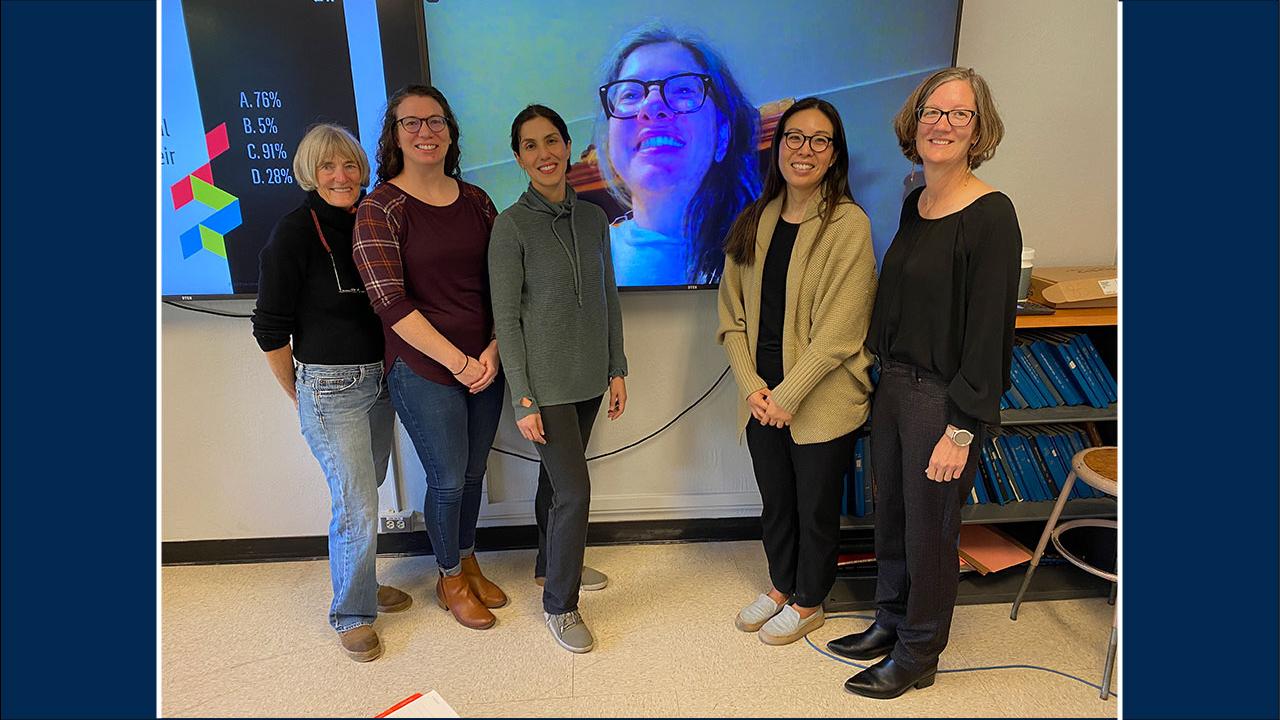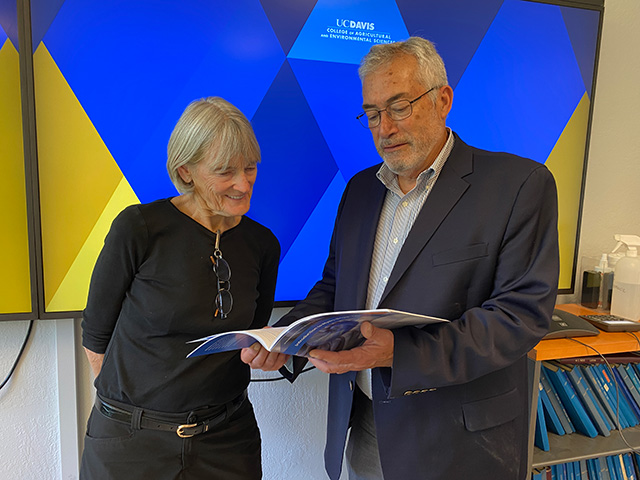
Ferguson grows women’s leadership with Webster Scholar Award
Goal: Women in the boardroom
Diversity programs across education have done a good job of exposing girls to science, University of California scientist Louise Ferguson said. “I see plenty of girls in STEM (science, technology, engineering and medicine). What I don’t see is plenty of women in the boardroom.”

Ferguson aims to change that with a program that cultivates leadership skills among early career women faculty in her own department, the UC Davis Department of Plant Sciences, plus others in the College of Agricultural and Environmental Sciences. As the winner of the second annual Barbara D. Webster Scholar Award, Ferguson has provided opportunities for women faculty to reflect on their own personalities, communication styles and frameworks for seeing others and the world; form a support network that will help them navigate academia; and build on their strengths and connections so they can take their careers farther.
“I didn’t have it when I was young, and I remember how hard it was,” said Ferguson, who is a professor of UC Cooperative Extension specializing in tree crops. Even though women in academia have achieved parity with men in many ways, “there’s still a glass ceiling,” she added. “I really want to see women advance to the next level.”
Nine early career women faculty participated in seminars every other month over the summer and fall quarters, aided by professionals Ferguson and colleague Amanda Crump brought in for key training and discussions. The Webster Award supported the work with a $20,000 grant.
Step one: Know yourself
Participants in Ferguson’s program used several tools to assess themselves. Her aim was helping them develop better interpersonal relations.
“Being effective at anything, in any profession, starts with understanding yourself and your emotions… your reactions, how people view you, how you sabotage yourself,” Ferguson said. “If you don’t understand yourself, you’re not going to do a very good job of understanding other people.”

One of those tools was the Myers Briggs Type Indicator Assessment, which illuminates people’s personality types as a basis for how we interact with others. Participants also took the Intercultural Development Inventory, which helped them see how they respond and adapt to cultures other than their own. The Thomas-Kilmann Conflict Mode Instrument told participants about their default communication styles, an aid for seeing how misunderstandings and conflicts can arise, and how to prevent or handle them.
The Harvard Implicit Bias test reveals how people see the world. The Crucial Conversations program shows how conversations and situations can go sour, helps people recognize when it’s happening and suggests how to steer things aright. Lessons from Emotional Intelligence show how others see us.
The tests may reveal unpleasant truths, but the good news is, Ferguson said, “these are not enduring traits. We can change.”
Step two: Form your posse
Ferguson defines one’s posse as “friends you can talk to without judgement.” It’s a central pillar for an enjoyable career, she added.
Posse members can advise each other wisely and helpfully. “I want this program to teach them to advocate for one another,” Ferguson said. “They can suggest new positions to apply for, include each other on grants, generally cooperate and support one another.”
Step three: Take action
As the program unfolds, participants will decide what actions come out of their deeper knowledge and closer connections. “That may include advocating for the university or for agriculture," Ferguson said. Crump will wrap up the program in early 2024 with additional assessments.
The final plan: Participants’ work on themselves will lead to greater effectiveness in their careers and lives.
Step four: Pass it on

When Ferguson was a girl, she would scrap with her sister. “She irritated me, and I didn’t understand why,” Ferguson recalled
As an adult forging a career, she made a lot of mistakes. “I didn’t understand myself well and how I interacted with other people. I didn’t get much feedback, or didn’t listen to it,” Ferguson observed. “Looking back, I think I could have done so much more and been more effective if I had had more orientation toward my behavior and interpersonal relations.”
Over the years, Ferguson learned the very tools and frameworks that she is now teaching with the help of her Webster Award. One discovery: Her personal style is similar to that of her sister. “We were both what the Myers Briggs test defines as ENTJs, also known as ‘Commanders.’ We were both constantly jostling to be in charge,” Ferguson said.
Through her journey, Ferguson grew a passion for teaching leadership to others. Many of the assessments she has offered through her Webster project she first took herself through the grower-funded California Agricultural Leadership Program and through programs offered by UC Agricultural and Natural Resources, which oversees Cooperative Extension programs and specialists. After going through some of those programs herself, Ferguson started leading them, with activities that included lobbying trips to Washington, D.C., and visits to other cities and countries, “to get people out of their comfort zone,” Ferguson said.
In 2013, Ferguson and fellow faculty member Beth Mitcham asked the chair the Department of Plant Sciences for money to start Women in Plant Sciences. They started informal gatherings in the evenings for the women without children and at noon for the moms. Recently, she mentored colleague Amanda Crump to replace her as faculty for the California Agricultural Leadership Program, and Crump also is co-leading the Webster-funded program.
Driving her passion: She wants younger colleagues to have what she lacked. “I didn’t have a female cohort to talk to,” Ferguson said, recalling her early days at the UC Kearney Agricultural Research and Extension Center in Parlier, Calif. “When I was young, it was me and a bunch of old men.”
Now, Ferguson added, women faculty “can get together and talk about solutions.”

Webster, WIPS and more
About the Barbara D. Webster Scholar Award: Ferguson is the second person to earn this award, receiving it in 2023. It was endowed in 2020 by Susan V. Webster in honor of her mother, Barbara D. Webster. The elder Webster was the first woman appointed to a faculty position in what eventually became the Department of Plant Sciences. The award supports initiatives to advance women in the department.
More about Louise Ferguson.
Ferguson's leadership program was a one-time series for early career women faculty in the UC Davis Departments of Plant Sciences, Food Science and Technology, Agricultural Economics, Plant Pathology and Land, Air and Water Resources. For more information, contact Ferguson at lferguson@ucdavis.edu.
About WIPS: Watch for details to be announced about the Women in Plant Sciences gatherings, which will resume in winter quarter 2024. For details, contact Ferguson at lferguson@ucdavis.edu.
The California Agricultural Leadership Program was founded 53 years ago by the Kellogg Foundation in cooperation with UC Davis, California State University Fresno and the California Polytechnic State University campuses in Pomona and San Luis Obispo.
Media Resources
- Trina Kleist, UC Davis Department of Plant Sciences, (530) 601-6846, tkleist@ucdavis.edu
